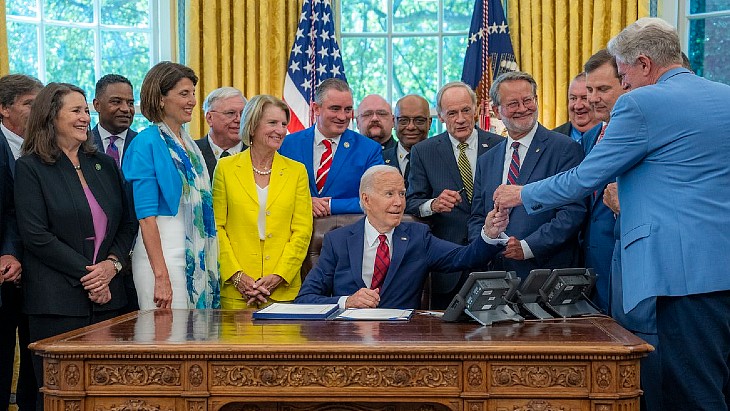UK regulator clarifies role for Nuclear Safeguards Bill
The UK's Office for Nuclear Regulation (ONR) has clarified two points in the impact assessment of the Nuclear Safeguards Bill published last month by the Department for Business, Energy and Industrial Strategy (BEIS). The clarifications are "part of our ongoing constructive engagement" with BEIS to develop a domestic safeguards regime as part of the UK's exit from the European Atomic Energy Community (Euratom), the ONR said.
The British government announced it intends to leave Euratom when, in January, it published a bill authorising Brexit. The peaceful use of nuclear energy within the EU is governed by the 1957 Euratom Treaty. The Euratom Community is a separate legal entity from the EU, but it is governed by the bloc's institutions.
The first clarification is that ONR regulates the nuclear industry; it does not provide services to it. Secondly, the government's policy has developed since the assessment was undertaken and the intention is to put in place a regulatory framework which is robust and as comprehensive as Euratom, the ONR said. This means that it is not in a position to identify potential efficiencies in its regulatory approach at this stage, it added.
"As we support BEIS in its development of secondary legislation, we will provide advice to the government to inform the anticipated impact assessment for nuclear safeguards regulation," it said.
Impact assessment
The impact assessment, signed on 11 December by Richard Harrington, BEIS undersecretary of state, states that the civil nuclear sector is subject to robust international non-proliferation measures, which include nuclear safeguards. Nuclear safeguards arrangements are essential, it says, to enable the UK to engage in civil nuclear trade, allowing nuclear generation to play an important role in energy security and decarbonisation objectives, and to fulfil international standards as a responsible nuclear state, which are an important part of the international non-proliferation regime to prevent the spread of nuclear weapons.
The UK's current nuclear safeguards obligations are fulfilled through its membership of Euratom and a new safeguards regime is needed to continue meeting international standards following withdrawal from the Euratom Treaty, it says. Leaving Euratom is "as a result of the decision to leave the EU as they are uniquely legally joined", it says. "There are no precedents for a non-EU Member State being a Member State of Euratom, so when we formally notified our intention to leave the EU we also commenced the process for leaving Euratom," it says.
The policy objective is to ensure arrangements are in place to fulfil international nuclear safeguard standards.
"These arrangements form an essential part of the global nuclear non-proliferation regime, to which the UK is committed. Our future arrangements will need to be robust and as comprehensive as the current Euratom regime to enable public confidence in the continued high standards and give international partners confidence in engaging in civil nuclear trade with the UK, many of whom require this to agree nuclear cooperation agreements; to support the UK's ongoing commitment to the global non-proliferation regime; show that the UK is a responsible nuclear state, and; to avoid weakening the UK's international reputation as a non-proliferation leader," the document says.
"The primary legislation this impact assessment supports will not impose any obligations on holders of nuclear material or on the nuclear industry, thus the impacts of primary legislation are zero. This Bill enables the UK to set up a domestic safeguards regime. This Bill also ensures the ONR will be in a position to take on the role and responsibilities required to help ensure the UK's domestic civil nuclear safeguards regime meets international safeguards standards. The secondary legislation will implement the specific requirements on industry. This impact assessment provides indicative impacts of safeguards: however, our assessment will be subject to further refinements for secondary legislation," it says.
For the UK to fulfil international standards on nuclear safeguards and non-proliferation once it leaves the EU, the existing legislative framework must be amended, with a new regime set out in new secondary legislation, it says. In the absence of amending frameworks and work to implement new safeguards measures, the UK would be without an effective nuclear safeguards regime, it adds.
"This scenario is the relevant counterfactual for policy appraisal given the decision to leave Euratom has already been taken and domestic safeguards appraised here are not dependant on the future relationship with the EU. However, we have also included a counterfactual of ’current Euratom regime’ to compare impacts relative to the current regime under Euratom. The UK's withdrawal from Euratom has already been triggered so this is only included as baseline for consistency with other EU exit related measures where legislation may be dependent on the negotiated outcomes on future relationship with the EU," it says.
Two options
Two core options have been considered.
The first is to adopt domestic standards of nuclear safeguards of broad equivalence to those adopted by Euratom, which BEIS says would ensure that sites to which safeguards apply remain subject to detailed oversight and that the UK continues to maintain the highest standards of nuclear safeguards.
"This is the preferred option as it best retains industry, public and international confidence in a robust safeguard regime," it says. The Nuclear Safeguards Bill, and the regime that we propose to implement through it, will work to deliver this option."
On the second option, which fulfils nuclear safeguards standards, without replicating Euratom's standards, BEIS says that all civil nuclear facilities to which safeguards apply would remain subject to a robust safeguards regime.
"This option would however entail a reduction in the frequency and intensity of inspection at UK nuclear facilities, while still maintaining compatibility with IAEA [International Atomic Energy Agency] standards," it says.
David Wagstaff, deputy director of the Euratom exit at BEIS, told a conference last month that the "parliamentary balance" on the Bill's passage through Parliament is "quite a delicate one at the moment". If all goes to plan, however, the Bill will receive Royal Assent early this year, he added.
The ONR and BEIS are working "hand-in-hand" and this project is "going at pace", with recruitment and IT procurement in process.
Researched and written
by World Nuclear News










_50521.jpg)

